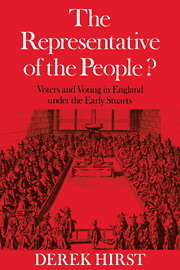Crossref Citations
This Book has been
cited by the following publications. This list is generated based on data provided by Crossref.
Hill, Lamar M.
1977.
Continuity and Discontinuity: Professor Neale and the Two Worlds of Elizabethan Government.
Albion,
Vol. 9,
Issue. 4,
p.
343.
Johnson, George W.
1977.
1976 Annual Supplement.
p.
1.
Grosvenor, Ian D.
1977.
Catholics and Politics: The Worcestershire Election of 1604.
Recusant History,
Vol. 14,
Issue. 2,
p.
149.
Shammas, Carole
1977.
The Determinants of Personal Wealth in Seventeenth-Century England and America.
The Journal of Economic History,
Vol. 37,
Issue. 3,
p.
675.
Gruenfelder, John K.
1978.
Dorsetshire Elections, 1604-1640.
Albion,
Vol. 10,
Issue. 1,
p.
1.
Clark, Peter
1978.
Thomas Scott and the Growth of Urban Opposition to the Early Stuart Regime.
The Historical Journal,
Vol. 21,
Issue. 1,
p.
1.
Holmes, Clive
1980.
The County Community in Stuart Historiography.
Journal of British Studies,
Vol. 19,
Issue. 2,
p.
54.
Zaller, Robert
1980.
The Concept of Opposition in Early Stuart England.
Albion,
Vol. 12,
Issue. 3,
p.
211.
Hirst, Derek
1980.
Parliament, Law and War in the 1620s.
The Historical Journal,
Vol. 23,
Issue. 2,
p.
455.
Kent, Joan
1981.
The English Village Constable, 1580-1642: The Nature and Dilemmas of the Office.
Journal of British Studies,
Vol. 20,
Issue. 2,
p.
26.
Fulbrook, Mary
1982.
The English revolution and the revisionist revolt.
Social History,
Vol. 7,
Issue. 3,
p.
249.
Morrill, John
1982.
Reactions to the English Civil War 1642–1649.
p.
1.
Cope, Esther S.
1982.
Politics without Parliament: The Dispute about Muster Masters' Fees in Shropshire in the 1630s.
Huntington Library Quarterly,
Vol. 45,
Issue. 4,
p.
271.
Lake, P. G.
1982.
Constitutional Consensus and Puritan Opposition in the 1620s: Thomas Scott and the Spanish Match.
The Historical Journal,
Vol. 25,
Issue. 4,
p.
805.
Herrup, Cynthia
1983.
The counties and the country: Some thoughts on seventeenth‐century historiography∗.
Social History,
Vol. 8,
Issue. 2,
p.
169.
Morgan, Victor
1984.
Whose prerogative in late sixteenth and early seventeenth century England?.
The Journal of Legal History,
Vol. 5,
Issue. 3,
p.
39.
Hughes, Ann
1985.
The King, the Parliament, and the Localities during the English Civil War.
Journal of British Studies,
Vol. 24,
Issue. 2,
p.
236.
Searing, Donald D.
1985.
The Role of the Good Constituency Member and the Practice of Representation in Great Britain.
The Journal of Politics,
Vol. 47,
Issue. 2,
p.
348.
Cottret, Bernard
1986.
Le Roi, les Lords et les Communes : monarchie mixte et états du royaume en Angleterre (XVIe-XVIIIe siècles).
Annales. Histoire, Sciences Sociales,
Vol. 41,
Issue. 1,
p.
127.
Zaller, Robert
1986.
What Does the English Revolution Mean? Recent Historiographical Interpretations of Mid-Seventeenth Century England.
Albion,
Vol. 18,
Issue. 4,
p.
617.





